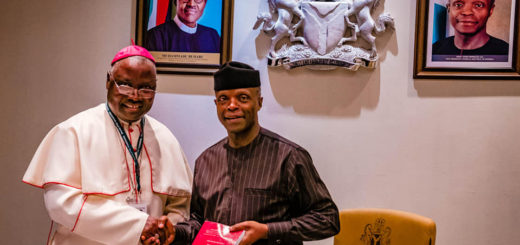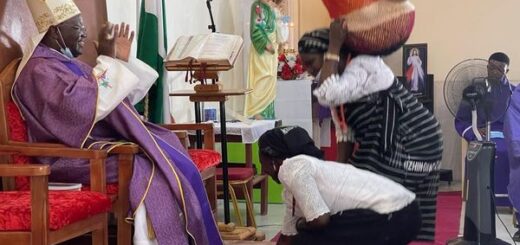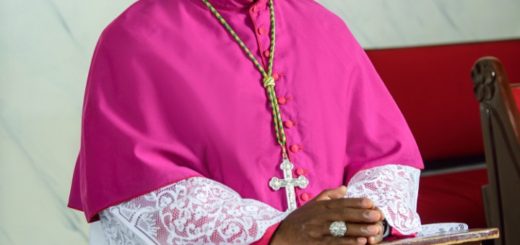The Bread of Life: A spiritual nourishment that is Jesus
by ARCH BISHOP · August 11, 2024
19th Sunday, Year B, St. Francis Parish Bagusa, Abuja, 11.08.2024. Homily by Archbishop I. A. Kaigama.
Readings: 1 Kings 19:4-8; Ephesians 4:30-5:2; John 6:41-51
The Bread of Life: A spiritual nourishment that is Jesus
Gathered today with you the parish priest, Fr. Benedict Udemba, equally as the Dean of Karimo deanery and also chairman of the eight deans in the Archdiocese of Abuja, I bring you warm greetings with prayers that the grace of God and His immeasurable blessings may come upon you beloved parishioners of St. Francis Parish Bagusa, far more than you could ever imagine or guess or request in your wildest dreams! (cf. Eph. 3:20).
As we celebrate the Sacrament of the Most Holy Eucharist, in which Christ left us His Body, His very self as nourishment and food for the journey ahead, 381 parishioners of yours will receive the Sacrament of Confirmation, through which they will receive the Holy Spirit and become more strengthened in their Christian life; to become more mature Christians, ambassadors of Christ, sincere Christian witnesses in our society bedeviled by multidimensional ills, immorality, violence; a society that violates the sacredness of human life and perpetuates corruption without conscience and so fails to see the severe suffering, poverty and unprecedented hunger witnessed in towns and villages. You, the confirmed are to be soldiers, not like soldiers who carry guns and bullets, bows and arrows, knives and cutlasses to injure or kill or threaten or intimidate people, but soldiers armed with the word of God, with religious values that you translate into daily life; not only practicing a nominal or cultural religion or ceremonies that many perform as purely external religious rites, deprived of interior renewal or the concrete application of their religious values to their private life or work, or to loving others without ethnic or religious bigotry. You are soldiers whose weapons are peace, and love and who should always aim at doing whatever is true, whatever is honorable, whatever is right, whatever is pure, whatever is lovely, whatever is of good repute, …” (Phil 4:8-9).
With the intense activities of our two major faiths in Nigeria, one can only wish to see Nigeria transformed into an oasis of social, political, economic, and religious tranquility. Instead what we see are chaos, cruelty, dishonesty, misdirected ethnic and religious intolerance and throughout our history since independence, even when the so-called leaders of faith are in authority, we still witness bad governance as in the past just as it is today, resulting in poverty, criminality, hunger, and violence.
My pastoral visit today is unique in the sense that I came not only to celebrate the Eucharist, the bread of life, but considering the climate of hunger that is prevalent, and being an eyewitness to the many who cry daily about hunger, I decided to bring some cooked food with me. I wish I could command five loaves and two fish like Jesus did to feed thousands, but since I am unable to do that to satisfy the teeming hungry people, inspired by the ancient Chinese proverb that says, “It is better to light a candle than to curse the darkness,” meaning it is better to do something about a problem than just complain or lament about it, I used two bags of rice I got as a gift donated to me by some friends and a cow to cook a meal to be distributed to the children, who due to very high cost of foodstuffs may not have eaten any breakfast before coming to Church today, and may likely not have lunch on returning home. It might not go round, but it is my gesture of goodwill and desire that nobody should starve in a country as blessed as Nigeria. If we all share the little we have, we can replicate in a way, that miracle that Jesus worked that could transform five loaves and two fish to feed more than five thousand people.
Last week the Catholic Church received through the office of the Christian Association of Nigeria (CAN) FCT Chapter,” a correspondence from “the Federal Capital Territory Administration, Agriculture and Rural Development Secretariat” dated 22nd July, 2024, addressed to the “Christian Association of Nigeria (CAN), FCT Chapter.” The letter informed the FCT CAN that the Federal Capital Territory sent an “Allocation of food items from FGN through the Federal Ministry of Agriculture and Food Security and NEMA,” explaining that the Federal Minister of FCT “has approved the allocation of the following food items for onward distribution to the members of your association free of charge.” The grains were: 468 bags (50kg) of maize, 1,392 bags (50kg) of guinea corn, 110 bags (50kg) of millet, and 96 bags (50kg) of garri. It was explained that “This allocation is in line with President Bola Ahmed Tinubu’s directives towards alleviating the impact of high food prices in Nigeria.” The items are to be collected at the “Agriculture & Rural Development Secretariat’s Agro Service Centre at Gwagwalada” and the letter added that “the logistics on this allocation are to be borne by you.”
Out of this allocation, the Catholic Church in the FCT was allocated 13 bags of maize, 130 bags of guinea corn, 60 bags of millet, and 10 bags of garri. This is in addition to the 50 bags (25kg) of rice that earlier, had been granted to our bloc as Catholic Church. Even though these are yet to be collected, I have instructed that only the parishes which, for years now, have been looking after the internally displaced people (IDP) from the North East and elsewhere, are to collect the items for immediate distribution to the IDP members of their parishes. The lesson here is, if each and every one of us share the little that is available, it can transform lives positively.
In today’s Gospel, we continue to reflect on Jesus as the Bread of Life. The people thought that Jesus’ statements were outrageous and blasphemous. They murmured and made erroneous conclusions. Jesus, perceiving their ignorance, did not allow their negativity and lack of understanding to deter Him from accomplishing His mission to teach and offer them His life.
To obtain the life of Jesus from the bread He gives, we must first believe in His word that He is the bread of life. If we believe in the presence of Jesus in the Eucharist, we will receive His life from it, and that life provides us with the strength needed to sustain our life’s trials. But we have to receive it with purity of heart – a heart devoid of hatred, anger, slander, and malice, as St. Paul admonishes us in the second reading.
In the first reading, we read that having suffered so much at the hands of Jezebel and those who sought to kill him, Elijah had to cry out in despair, asking God to take his life. Like Elijah, some of us are on the run from different challenges and uncertainties of this life. We are saying: “Lord, I have had enough. Take my life!” In the case of Elijah, in order to give him the strength to go on, God sent an angel to give him food to eat to sustain him so that the journey ahead might not overwhelm him, and indeed, it did not. At the end of his earthly mission, he was taken up to heaven, without dying (cf. 2 Kings 2:11).
God will provide for us in one way or the other. All hope is not lost. He will intervene to nourish and strengthen us. Like Elijah, we all experience moments of exhaustion and despair. We may feel overwhelmed by the challenges of life and be tempted to give up. Just hold on. God never abandons us. He provides us with the spiritual and material nourishment we need if only we believe and trust in His Providence.
So, do whatever it takes to receive the Body of Jesus. If it means putting away from you all bitterness, wrath, anger, wrangling, and slander together with all malice, and being kind to one another, tender-hearted and forgiving one another, as St. Paul admonished us, let us do; if it means rectifying your marriage, do; if it means avoiding every evil and all that grieves the Holy Spirit of God, please do. Anything that is a hindrance to your partaking of this most holy Body of Christ, deal with it effectively.
As we receive the Bread of Life, we are called to be transformed by it. We must avoid making the Holy Spirit sad through our sinful actions; we must obey, trust, and walk with Him. The Holy Spirit leads us to Christ, the living bread who nourishes and equally strengthens us for our journey. As God instructed Elijah in the desert, “Arise, eat, drink, and continue your journey,” (Cf. 1 Kings 19:5-8) Jesus invites us to partake in the Holy Eucharist, revitalizing us with new hope, zeal, and spirit. Be what you receive.




